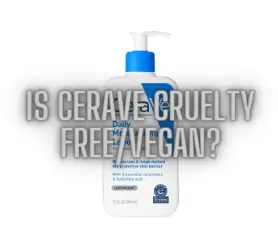CeraVe is a skincare brand widely lauded by dermatologists and consumers alike for its moisturizing products that are enriched with ceramides, hyaluronic acid, and other essential ingredients that promote a healthy skin barrier. As the beauty industry continues to evolve with a growing emphasis on ethical standards, questions frequently arise regarding whether CeraVe’s product range aligns with vegan and cruelty-free values. This in-depth analysis explores CeraVe’s current status in these areas and the implications for consumers seeking ethically-conscious skincare.
Understanding Cruelty-Free and Vegan Skincare
Before diving into CeraVe’s practices, it’s essential to define what ‘cruelty-free’ and ‘vegan’ mean in the context of skincare:
- Cruelty-Free: This term indicates that a product and its ingredients have not been tested on animals. It also implies that the brand does not sell in countries where animal testing is required by law.
- Vegan: Vegan skincare products contain no animal-derived ingredients or by-products. This includes common non-vegan substances such as honey, beeswax, lanolin, collagen, and keratin.
Is CeraVe Cruelty-Free?
CeraVe is not certified cruelty-free by any major animal rights organizations, such as Leaping Bunny or PETA. The brand, owned by L’Oréal, has stated that they do not test on animals unless required by law. This caveat is significant because it means that CeraVe may choose to sell their products in markets, such as mainland China, where animal testing for foreign cosmetics can be mandated by regulatory agencies.
The involvement of parent companies can also affect the perception of a brand’s cruelty-free status. L’Oréal, despite making strides towards alternative testing methods, still does not meet the strictest cruelty-free criteria due to similar policies and market choices.
Is CeraVe Vegan?
CeraVe’s product formulations include ingredients such as cholesterol and glycerin, which can be derived from animal sources. While plant-based alternatives for these ingredients exist, CeraVe does not explicitly claim that their products are vegan, nor do they provide a vegan product line. Therefore, it is safe to assume that CeraVe is not entirely vegan.
For those seeking vegan skincare, it is necessary to scrutinize ingredient lists or seek out products with certified vegan labels to ensure that the items are free from animal derivatives.
The Role of Certifications and Transparency
The presence of official cruelty-free and vegan certifications helps consumers make informed decisions at a glance. Certifying organizations have rigorous standards and verification processes to ensure that a brand’s practices align with the ethical claims it makes.
Transparency from skincare companies is increasingly important to the modern consumer. Brands that are forthcoming about their manufacturing processes, sourcing, and corporate policies can build trust and loyalty with their customers. By obtaining and displaying cruelty-free and vegan certifications, companies like CeraVe could significantly enhance their reputation among ethically-minded consumers.
Ethical Alternatives to CeraVe
For those prioritizing cruelty-free and vegan skincare, there is no shortage of alternatives to CeraVe. Numerous brands have committed to producing products that do not involve animal testing and are free from animal-derived ingredients. These companies often sport the Leaping Bunny or PETA’s cruelty-free bunny logos and may have vegan certifications to provide assurance of their commitments.
When searching for alternatives, consumers should look for clear and prominent labeling, and when in doubt, reach out to companies directly to inquire about their policies. The demand for ethical products has led to a rise in availability, with options ranging from affordable drugstore lines to premium brands.
The Impact of Consumer Choices
Consumer behavior is a powerful force capable of driving change within the beauty industry. By choosing to support cruelty-free and vegan brands, consumers can encourage more companies to consider the ethical implications of their practices.
Advocacy and demand for cruelty-free and vegan products have already led to substantial changes. Some brands have reformulated their products to be vegan-friendly, while others have pulled out of markets that require animal testing or invested in alternative testing methods to avoid animal cruelty.
CeraVe’s Path to Becoming Cruelty-Free and Vegan
CeraVe could take several steps to align more closely with cruelty-free and vegan values:
- Certification: Obtaining cruelty-free certification from a respected organization would require changes to CeraVe’s policies and practices, particularly in relation to the markets in which they choose to sell.
- Vegan Formulations: Developing a line of vegan products or transitioning existing products to vegan-friendly formulations would cater to the growing market for such items.
- Transparency: Being clear and open about their testing methods, ingredient sourcing, and business decisions would help customers make informed choices.
- Alternative Testing: Investing in and advocating for alternative testing methods could help to push the industry awayfrom the reliance on animal tests and demonstrate a commitment to ethical science.
Final Thoughts
In the landscape of modern skincare, the ethics behind a product can be as important as its efficacy. CeraVe is recognized for its scientifically-formulated products that support skin health, but when it comes to their cruelty-free and vegan status, there is ambiguity. The brand is not certified cruelty-free, as it sells in markets where animal testing is required, and it does not claim to offer vegan products.
For those committed to ethical skincare, this may necessitate looking to other brands that have made concrete pledges to avoid animal testing and animal-derived ingredients. As consumers continue to voice their preferences for cruelty-free and vegan products, there is an opportunity for CeraVe and similar brands to evolve and adopt practices that reflect these values.
Ultimately, the power lies with consumers to shape the beauty industry through their purchasing decisions. By supporting brands that are transparent about their cruelty-free and vegan commitments, consumers contribute to a market shift towards more ethical skincare solutions. It remains to be seen whether CeraVe will make the necessary changes to satisfy the growing demand for ethically-conscious skincare. For now, consumers must navigate the market with care, armed with the knowledge that their choices have the power to influence industry standards and promote a more humane approach to beauty.


